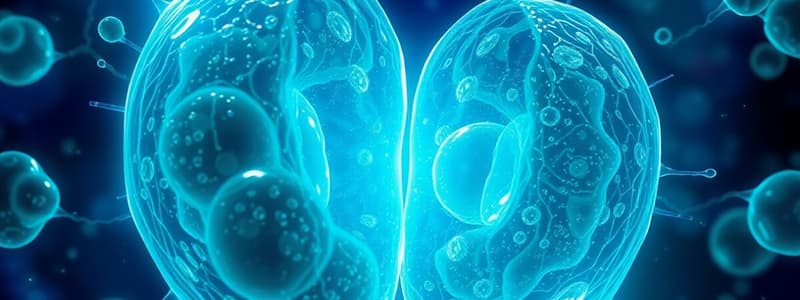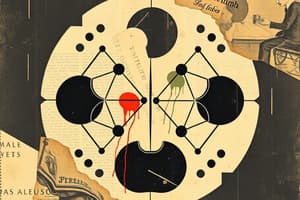Podcast
Questions and Answers
What are the two main stages of cell division?
What are the two main stages of cell division?
Which phase of the cell cycle occurs immediately after mitosis and cytokinesis?
Which phase of the cell cycle occurs immediately after mitosis and cytokinesis?
What is primarily observed during interphase?
What is primarily observed during interphase?
What is indicated by a small Surface to Volume ratio (S/V) in cells?
What is indicated by a small Surface to Volume ratio (S/V) in cells?
Signup and view all the answers
During which stage does the spindle apparatus form?
During which stage does the spindle apparatus form?
Signup and view all the answers
What is the main purpose of the G1 checkpoint in the cell cycle?
What is the main purpose of the G1 checkpoint in the cell cycle?
Signup and view all the answers
During which phase of the cell cycle does DNA replication occur?
During which phase of the cell cycle does DNA replication occur?
Signup and view all the answers
What is the function of centrioles in animal cells?
What is the function of centrioles in animal cells?
Signup and view all the answers
What effect do anti-tumor drugs that act as microtubule inhibitors have on cancer cells?
What effect do anti-tumor drugs that act as microtubule inhibitors have on cancer cells?
Signup and view all the answers
Why is a limited genome to volume ratio important for cell growth?
Why is a limited genome to volume ratio important for cell growth?
Signup and view all the answers
Which cellular structure is responsible for the replication of DNA in the S phase?
Which cellular structure is responsible for the replication of DNA in the S phase?
Signup and view all the answers
What happens to a cell if it grows too large?
What happens to a cell if it grows too large?
Signup and view all the answers
Which structure stabilizes microtubules during the mitotic phase?
Which structure stabilizes microtubules during the mitotic phase?
Signup and view all the answers
During which stage of mitosis do the chromosomes line up at the cell's equator?
During which stage of mitosis do the chromosomes line up at the cell's equator?
Signup and view all the answers
What happens to the nuclear envelope during prophase?
What happens to the nuclear envelope during prophase?
Signup and view all the answers
How many chromosomes are present at the beginning of anaphase?
How many chromosomes are present at the beginning of anaphase?
Signup and view all the answers
In which phase does the chromatin condense into visible chromosomes?
In which phase does the chromatin condense into visible chromosomes?
Signup and view all the answers
What is the function of kinetochores during mitosis?
What is the function of kinetochores during mitosis?
Signup and view all the answers
After cytokinesis, how many chromosomes are found in each daughter cell?
After cytokinesis, how many chromosomes are found in each daughter cell?
Signup and view all the answers
What is the outcome of anaphase in terms of chromosome number in each pole?
What is the outcome of anaphase in terms of chromosome number in each pole?
Signup and view all the answers
What occurs during the G1 phase before mitosis begins?
What occurs during the G1 phase before mitosis begins?
Signup and view all the answers
What is the primary outcome of meiosis?
What is the primary outcome of meiosis?
Signup and view all the answers
During which phase does crossing over occur in meiosis?
During which phase does crossing over occur in meiosis?
Signup and view all the answers
What directly follows meiosis I?
What directly follows meiosis I?
Signup and view all the answers
What characterizes the daughter cells produced by meiosis?
What characterizes the daughter cells produced by meiosis?
Signup and view all the answers
Which structure is responsible for aligning chromosomes during metaphase?
Which structure is responsible for aligning chromosomes during metaphase?
Signup and view all the answers
What happens during meiosis II?
What happens during meiosis II?
Signup and view all the answers
How does genetic variation arise during meiosis?
How does genetic variation arise during meiosis?
Signup and view all the answers
In what ways are daughter cells from meiosis different from those produced by mitosis?
In what ways are daughter cells from meiosis different from those produced by mitosis?
Signup and view all the answers
What is the final result of cytokenesis following meiosis?
What is the final result of cytokenesis following meiosis?
Signup and view all the answers
During which phase of meiosis II do sister chromatids separate and move towards opposite poles?
During which phase of meiosis II do sister chromatids separate and move towards opposite poles?
Signup and view all the answers
What is the primary purpose of crossing over during meiosis?
What is the primary purpose of crossing over during meiosis?
Signup and view all the answers
What characterizes the cells produced by meiosis compared to those produced by mitosis?
What characterizes the cells produced by meiosis compared to those produced by mitosis?
Signup and view all the answers
How many rounds of cell division occur in meiosis?
How many rounds of cell division occur in meiosis?
Signup and view all the answers
What does genetic linkage refer to?
What does genetic linkage refer to?
Signup and view all the answers
What is the chromosome configuration during Metaphase II of meiosis?
What is the chromosome configuration during Metaphase II of meiosis?
Signup and view all the answers
What type of cells are produced at the end of mitosis?
What type of cells are produced at the end of mitosis?
Signup and view all the answers
Which event occurs during Anaphase I of meiosis?
Which event occurs during Anaphase I of meiosis?
Signup and view all the answers
What type of genetic diversity factor is a direct result of crossing over?
What type of genetic diversity factor is a direct result of crossing over?
Signup and view all the answers
What is formed during the process of synapsis?
What is formed during the process of synapsis?
Signup and view all the answers
What is the role of chiasmata in meiosis?
What is the role of chiasmata in meiosis?
Signup and view all the answers
During which phase does independent assortment of chromosomes occur?
During which phase does independent assortment of chromosomes occur?
Signup and view all the answers
What is the outcome of homologous chromosomes during Anaphase I?
What is the outcome of homologous chromosomes during Anaphase I?
Signup and view all the answers
What is the chromosome composition at the end of Telophase I?
What is the chromosome composition at the end of Telophase I?
Signup and view all the answers
What structure forms to facilitate the attachment of microtubules to chromosomes during meiosis?
What structure forms to facilitate the attachment of microtubules to chromosomes during meiosis?
Signup and view all the answers
How many chromatids are present during Prophase I?
How many chromatids are present during Prophase I?
Signup and view all the answers
Which of the following describes the benefit of independent assortment during meiosis?
Which of the following describes the benefit of independent assortment during meiosis?
Signup and view all the answers
What changes occur in the nucleus during Prophase I?
What changes occur in the nucleus during Prophase I?
Signup and view all the answers
Which term best describes the random joining of gametes during fertilization?
Which term best describes the random joining of gametes during fertilization?
Signup and view all the answers
Study Notes
Cell Division
- Cell division is a process where a single cell divides into two or more daughter cells.
- In diploid cells, chromosomes exist as homologous pairs.
- Humans have 46 chromosomes (23 pairs).
- Centrosomes, containing centrioles, are cellular structures in animal cells.
- Centrioles produce spindle fibers which separate sister chromatids during anaphase.
The Cell Cycle
- The cell cycle consists of interphase (G1, S, G2) and the mitotic phase (mitosis and cytokinesis).
- Interphase begins after mitosis and cytokinesis are completed.
- G1: Cell growth (protein, ribosome, and mitochondria replication), ensures conditions for DNA synthesis.
- S: DNA synthesis, creating sister chromatids. DNA replicates during the S phase, not mitosis.
- G2: Continued cell growth and preparation for cell division. Some organelles replicate.
- G0: Inactive state for cells that aren't growing or dividing (e.g., nerve and cardiac cells).
Regulation of Cell Cycles
- Surface Area to Volume Ratio (S/V): Small S/V leads to challenges in exchanging materials, triggering cell division.
- Genome to Volume Ratio (G/V): Decreased G/V can exceed the ability of the genome to produce needed proteins, leading to cell division.
Mitosis
- Prophase (46 chromosomes, 92 chromatids): Nucleus breaks down, nucleolus disappears, chromatin condenses into chromosomes. Early mitotic spindle forms.
- Metaphase (46 chromosomes, 92 chromatids): Chromosomes line up at the metaphase plate.
- Anaphase (92 chromosomes, 92 chromatids): Microtubules shorten, sister chromatids separate, and chromosomes move to opposite poles.
- Telophase and cytokinesis (92 chromosomes, 92 chromatids): Nuclear envelope reforms. Chromosomes decondense into chromatin, nucleoli reappear. End result of cytokinesis: two cells with 46 chromosomes each.
Meiosis
- Meiosis produces four non-identical haploid daughter cells from one diploid parent cell by repeating nuclear division twice.
- Meiosis I (homologous chromosomes separate): Prophase I, Metaphase I, Anaphase I, Telophase I. Homologous chromosomes separate to each end of the cell.
- Meiosis II (sister chromatids separate): Prophase II, Metaphase II, Anaphase II, Telophase II. Separated chromatids, now chromosomes, move towards opposite ends resulting in four genetically distinct daughter cells
- Crossing over occurs in Prophase I. Non-sister chromatids exchange genetic material from homologous chromosomes.
- Independent assortment occurs in Metaphase I, where the random orientation of homologous chromosomes in different alignment leads to different gamete combinations.
- The random joining of gametes further increases genetic variation during fertilization.
- Genetic variation results from crossing over, independent assortment and random joining of gametes.
Meiosis vs. Mitosis
| Feature | Meiosis | Mitosis |
|---|---|---|
| Chromosome Number | Reduced by half | Remains the same |
| Daughter Cells | 4 haploid cells (n) | 2 diploid cells (2n) |
| Genetically Identical? | No | Yes |
| Rounds of division | 2 | 1 |
| Separation event (anaphase) | Sister Chromatids in Meiosis II, homologous chromosomes in Meiosis I | Sister chromatids separate |
Studying That Suits You
Use AI to generate personalized quizzes and flashcards to suit your learning preferences.
Related Documents
Description
Explore the fascinating processes of cell division and the cell cycle through this informative quiz. Dive into the specifics of mitosis, the phases of the cell cycle, and the regulation of cellular growth. Perfect for biology students seeking to enhance their understanding of cellular mechanisms.




